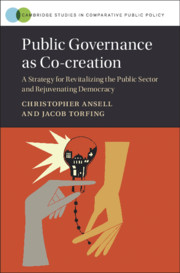 Public Governance as Co-creation
Public Governance as Co-creation Book contents
- Public Governance as Co-creation
- Cambridge Studies in Comparative Public Policy
- Public Governance as Co-creation
- Copyright page
- Dedication
- Contents
- Figures
- Tables
- Acknowledgments
- Abbreviations
- 1 A New Public Governance Based on Co-creation
- 2 The Concept of Co-creation
- 3 Co-creation Is Everywhere and Nowhere
- 4 Co-creation as Generative Governance
- 5 The Complex and Dynamic Process of Co-creating Public Value
- 6 Pathways to Co-created Public Value Outcomes
- 7 Co-creation as the Reinvention of Democracy
- 8 Mainstreaming and Scaling Co-creation
- 9 Handling Dilemmas, Avoiding the Dark Side, and Tackling Democratic Problems
- 10 Where Are We Today, and Where to Go from Here?
- References
- Index
8 - Mainstreaming and Scaling Co-creation
Published online by Cambridge University Press: 21 May 2021
- Public Governance as Co-creation
- Cambridge Studies in Comparative Public Policy
- Public Governance as Co-creation
- Copyright page
- Dedication
- Contents
- Figures
- Tables
- Acknowledgments
- Abbreviations
- 1 A New Public Governance Based on Co-creation
- 2 The Concept of Co-creation
- 3 Co-creation Is Everywhere and Nowhere
- 4 Co-creation as Generative Governance
- 5 The Complex and Dynamic Process of Co-creating Public Value
- 6 Pathways to Co-created Public Value Outcomes
- 7 Co-creation as the Reinvention of Democracy
- 8 Mainstreaming and Scaling Co-creation
- 9 Handling Dilemmas, Avoiding the Dark Side, and Tackling Democratic Problems
- 10 Where Are We Today, and Where to Go from Here?
- References
- Index
Summary
Transforming the way that public governance is produced and delivered is difficult given the combination of bureaucratic politics and institutional path-dependence. To imagine whether it is still possible, this chapter looks at how public leaders can transform public institutions through intentional reform and what kind of change they must bring about in order to advance and support co-creation. First, it discusses how different forms of strategic management can help to spur the transition to co-creation. Next, it presents four crucial conditions for enabling the future expansion of co-creation into a predominant mode of governance: 1) the creation of new institutional designs; 2) the cultivation of new forms of leadership and management; 3) the transformation of the role perceptions of key social and political actors; and 4) the development of new ways of measuring effects. The conclusion critically examines competing scenarios for the development of co-creation into a mode of governance and presents a five-step model for the transition to co-creation.
Keywords
- Type
- Chapter
- Information
- Public Governance as Co-creationA Strategy for Revitalizing the Public Sector and Rejuvenating Democracy, pp. 193 - 229Publisher: Cambridge University PressPrint publication year: 2021
